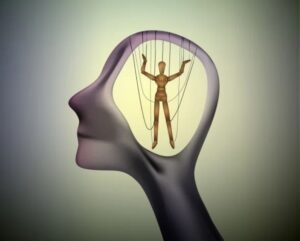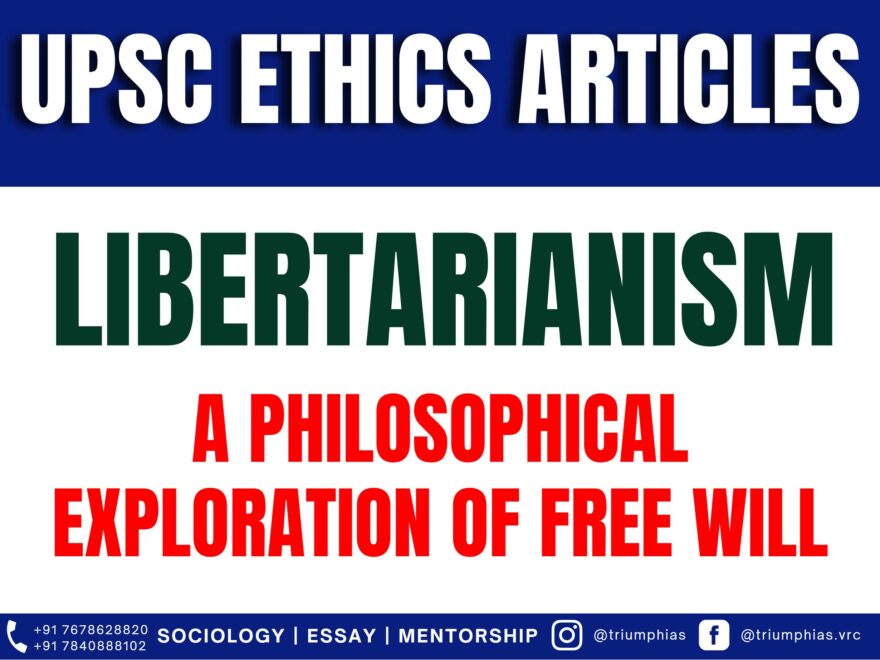Libertarianism
(Relevant for Ethics, Integrity and Aptitude)
Philosophers and scientists who advocate for the indeterministic nature of the universe and the existence of human free will are commonly referred to as “libertarians” (note that this term should not be confused with the political philosophy of libertarianism). However, it is worth noting that few contemporary philosophers defend the idea that the universe is indeterministic while human actions remain determined.

Libertarianism faces a challenge known as the “intelligibility” objection. This objection argues that a person has no more control over a purely random action than over an action that is deterministically inevitable. In both cases, free will does not play a role. Consequently, if human actions are indeterministic, the concept of free will becomes untenable. Here, I present a case scenario where a law enforcement officer unexpectedly engages in an act of vigilantism, resulting in the unintentional killing of an innocent child. This situation evokes memories of incidents involving stone-pelting and innocent bystanders being struck by rubber bullets. The intensity of such cases heightened public outrage, particularly when it involved the loss of innocent lives, leading to widespread condemnation of the perceived “atrocities” committed by the Indian State. It is important to note that this portion of the book was written during a period of escalated tensions in Jammu and Kashmir, characterized by a surge in stone-pelting incidents during the autumn and early winter of 2018. As previously mentioned, this book was written in a fragmented manner, and thus some of the text must be understood within a specific temporal context.
However, it is crucial to consider that the handlers of these stone-pelters often exploited children by involving them in exchange for monetary or other incentives. While writing this, I reiterate the significance of reading Part A and Part B (as explained in the prologue) in conjunction. Whenever you encounter a concept, it is advisable to connect it with a real-life example. By doing so, you not only enhance your understanding of the term but also become an active participant in its application.
Keep in mind that this paper is akin to a “game of words,” and your ability to skillfully navigate it while maintaining a nuanced understanding is paramount.
Immanuel Kant, a prominent German Enlightenment philosopher (1724-1804), was among the earliest proponents of libertarianism. He attempted to address the intelligibility objection and establish room for moral responsibility by proposing a form of dualism in human nature. In his work “Critique of Practical Reason” (1788), Kant argued that humans possess freedom when their actions are guided by reason. Reason, which he referred to as the “noumenal self” on occasion, is, to some extent, independent of the rest of the individual, enabling them to make morally informed choices. Kant’s theory suggests that reason must be disconnected from the causal order to have the capacity for autonomous decision-making while remaining connected to the causal order as a determining factor in human actions. The specifics of Kant’s viewpoint have been the subject of extensive debate, and its coherence remains uncertain.
Although libertarianism was not widely embraced by philosophers in the 19th century, it experienced a resurgence in the mid-20th century. The most influential accounts of the new wave of libertarianism were the “agent-causation” theories. Originating from the seminal paper “Human Freedom and the Self” (1964) by American philosopher Roderick Chisholm (1916-99), these theories propose that free actions are caused by the agent themselves rather than preceding events or circumstances. While Chisholm’s theory upholds the intuition that the ultimate source of an action—and consequently, the corresponding moral responsibility—rests with the agent, it fails to explain the specifics or mechanisms of agent-causation. Agent-causation
Explore libertarianism in philosophy, its role in the free will debate, and its application in real-life scenarios. From Kant to Chisholm, trace its evolution through centuries. Best Sociology Optional Coaching. These avenues provide comprehensive assistance, ensuring a solid understanding of sociology’s diverse methodologies and techniques.
Libertarianism, Philosophy, Free Will, Indeterministic Universe, Immanuel Kant, Roderick Chisholm, Agent-Causation, Moral Responsibility, Real-life Application, Intelligibility Objection, Best Sociology Optional Teacher, Best Sociology Optional Coaching, Sociology Optional Syllabus

